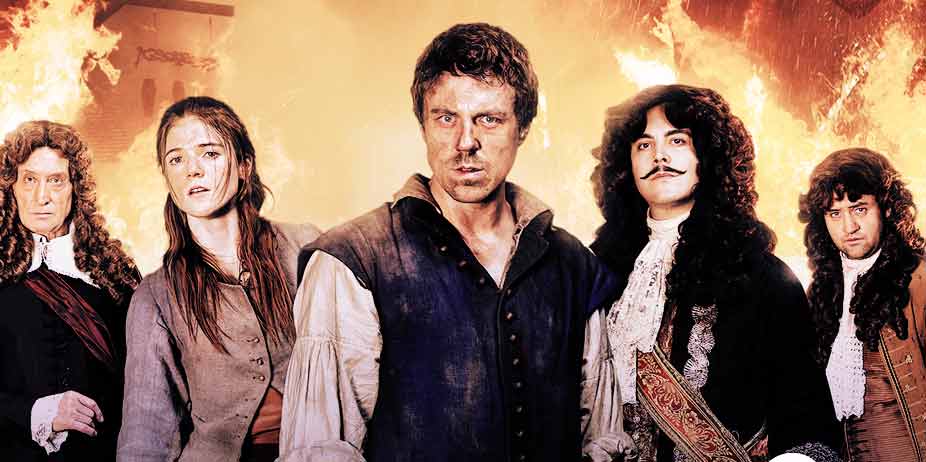 The
Great Fire (2014)
The
Great Fire (2014)
I'm always frustrated to find a film full of potential that does not quite reach the heights to which it might have climbed. This is one such miniseries, a lavish production on one of the great disasters of its time, with a wide cast of fictional and historical figures and a terrific cast. The problem is that it's too unbelievable and too ambitious in its scope, without the follow through to impact the audience.
It has been a long time since Sarah (Rose Leslie) has seen her husband, a navy man whose ship went down in flames. Left impoverished, she relies on the kindness of her brother-in-law, Thomas Farriner (Andrew Buchan), to see her through hard times... and also does needlework for the household of a wealthy member of court. Their lives are simple, and far outside the sphere of court intrigue. Nor is she aware that the compassionate older man who has taken an interest in her son is Lord Denton (Charles Dance), the king's "enforcer," whose job it is to reveal and eradicate threats to the throne. Charles II (Jack Huston) lives a merry life with his barren wife and pregnant mistress, while being oblivious to the fact that his lavish parties and wardrobe is driving the state into ruin. One aspiring status climber is Samuel Pepys (Daniel Mays), who hopes his attendance upon the king in his best interests will bring them greater fortune, but is having marital problems with his spirited young wife (Perditia Weeks).
Matters at court involving the king's bastard brother the Duke of York (Oliver Jackson-Cohen) escalate even as Thomas leaves his baking ovens one night to inform Sarah of her husband's fate. His daughter leaves the door of one open, a few sparks fall to the floor, and within an hour the entire street is on fire. Political intrigue and personal drama unfold even as the flames spread across London. You need a basic understanding of the history and figures of the period to know who anyone is; since it establishes no groundwork, I felt grateful for my familiarity with this court and the political upheaval which is much ignored (the Protestant/Catholic conflict would later escalate into a civil war). The intensity, the political factions, the rivalry, and the devastating fire are all done well, but much of the plot relies on the characters making stupid decisions just to keep them "in the line of fire" (ha, ha). If Sarah is not in the midst of intrigue contrived to keep her in peril, her son is running straight toward the fire.
There are so many characters we don't get to spend much time with any of them, which is a shame because the historical figures of this period are interesting; the fascinating relationship between the king and his most recent conquest (famous for not giving into his advances, and thus holding his attention for years) is not unexplored, the romantic tension between Sarah and Lord Denton comes to no use, and then... the script drops plot lines, unresolves problems, and solves the main arc with a brief interview before the king, a few questions, and a dismissal. Four hours of espionage, persecution, and peril for the lives of the main characters end, and go home to their smoking ruins of a house and bake bread again. It's the most contrived, convenient, unbelievable, truncated ending I have ever seen. And it's a shame, because the cast is good and the costuming is gorgeous. It's obvious real money went into this production on the basis of making it look gorgeous alone, which means its overall lack of a decent script is an even greater loss.
Sexual Content:
The king propositions a woman for a threesome and she
declines; it's implied two main characters sleep together (she is married, but
her husband has abandoned her; they kiss and pull at each other's clothes and
fall out of the shot); a man pays another man to "use" his wife, then takes her
into another room where they undress and have sex (we hear them faintly through
a wall, and see some movement through a crack in the door); a woman nearly
commits adultery but decides not to, once she sees the bed. The king lives
openly with his mistress, to the distress of his wife. A woman is nearly raped
in prison (she is forced to the floor and straddled) until a man intervenes to
save her.
Language:
A few mild profanities and abuses of deity.
Violence:
Some violence is done to people in the streets; a woman is
roughly handled; people are tortured for information, sometimes brutally (some
blood); rioters hang a foreigner, who is shown twitching from a lamppost until
he dies.
Other:
None.
